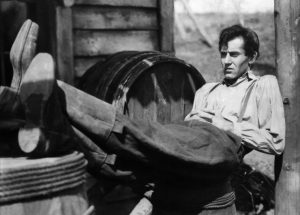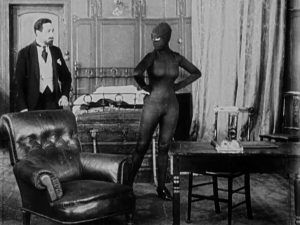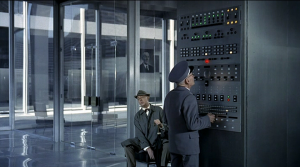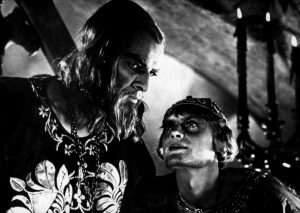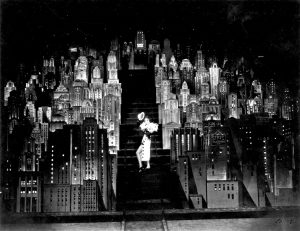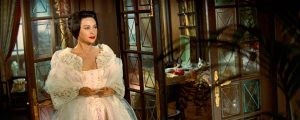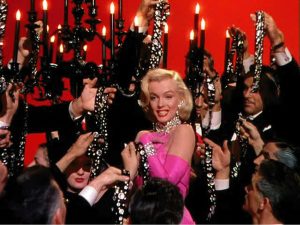YOUNG MR. LINCOLN – Vault Print!
John Ford (U.S. 1939) 101 min. 35MM. With Henry Fonda, Alice Brady, Marjorie Weaver.
John Ford’s political masterpiece stars Henry Fonda as a young Abraham Lincoln, in the years before his actions secured him his iconic place as America’s most important and revered President. Ford shows him clerking in a general store, studying law, suffering the loss of his first love, and then pursuing justice as an Illinois lawyer who defends two brothers accused of murder. Sergei Eisenstein called Young Mr. Lincoln “one of the most striking of all films of Ford; one of his most elegant and richest; one of the most amusing and captivating. A film I would like to have made.”
PERILS OF PAULINE – Episode 1: “Trial By Fire”
(Gasner & Mackenzie, 1914) With Pearl White, Crane Wilbur, Paul Panzer.
Playing with
LES VAMPIRES – EPISODE 3: “THE RED CRYPTOGRAM”
Louis Feuillade (France 1915-16) With Edouard Mathé, Marcel Lévesque, Fernand Herrmann, Jean Aymé, Musidora.
Perils of Pauline helped establish the popularity of the serial form, a genre of bizarre narrative twists, plethora of inventive mortal dangers and a resourceful protagonist pitted in each episode against a determined fiend. The undisputed master of the espionage serial is Louis Feuillade (Fantômas), whose labyrinthine plots and unforgettable characters influenced multiple generations of filmmakers. An unqualified masterpiece, Feuillade’s Les Vampires follows journalist Philippe Guérande in his efforts to expose a vast criminal organization known as the Vampires. Joined by a comical sidekick, and often competing against a rival gang lord, Guérande dethrones a succession of villains, but most evasive of all is the seductive assassin Irma Vep (Musidora). Authorized by Gaumont Studios, this edition was mastered from the 1996 35mm restoration produced by the Cinémathèque Française.
PLAYTIME
Jacque Tati (France 1967) 123 min. 35MM. With Jacques Tati, Barbara Dennek, Jacqueline Lecomte. In multiple languages with English subtitles.
Jacques Tati’s gloriously choreographed, nearly wordless comedies about confusion in an age of high technology reached their apotheosis with Playtime. For this monumental achievement, a nearly three-year-long, bank-breaking production, Tati again thrust the lovably old-fashioned Monsieur Hulot, along with a host of other lost souls, into a baffling modern world, this time Paris. With every inch of its super-wide frame crammed with hilarity and inventiveness, Playtime is a lasting record of a modern era tiptoeing on the edge of oblivion.
IVAN THE TERRIBLE, PART 2
Sergei M. Eisenstein (USSR 1946) 90 min. With Nikolai Cherkassov, Ludmilla Tselikovskaya, Serafima Birman. Russian with English subtitles.
Navigating the deadly waters of Stalinist politics, Eisenstein was able to film two parts of his planned trilogy about the troubled sixteenth-century tsar who united Russia (the director suffered a brain hemorrhage and died before filming of part 3 was completed). Visually stunning and powerfully acted, Ivan the Terrible charts the rise to power and descent into terror of this veritable dictator. Though pleased with the first installment, Stalin detested the portrait in the second film, with the summary executions and secret police of Ivan’s ruthless opposition to the scheming boyars. Stalin promptly banned the film, which was released in the Soviet Union until five years after his death.
TOP OF PAGE
Tuesday, February 14 at 1:15pm
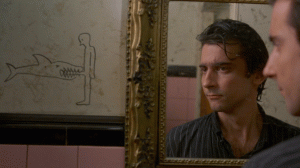
AFTER HOURS
Martin Scorsese (U.S. 1985) 97 min. 35MM. With Griffin Dunne, Rosanna Arquette.
Scorsese followed up his early 1980s classics The King of Comedy and Raging Bull with this equally enduring journey to the end of the New York night. Slightly uptight (and uptown-dwelling) typist Griffin Dunne improbably picks up Rosanna Arquette in a coffee shop when he spies her reading Henry Miller’s Tropic of Cancer, and an invitation to come visit her bohemian loft in hip and dangerous downtown SoHo results in our hero embarking on a hilarious and nightmarish odyssey, in which he tries to get back home. But, channeling The Exterminating Angel, SoHo and its residents simply refuse to let him leave… (Film Society of Lincoln Center Program Notes)
TOP OF PAGE
Tuesday, February 28 at 1:15pm
42ND STREET
Lloyd Bacon (U.S. 1933) 90 min. 35MM. With Dick Powell, Ruby Keeler, Bebe Daniels, Ginger Rogers.
42nd Street is the archetypical backstage musical. Here, the now familiar story sees striving understudy Ruby Keeler (in her film debut) get her big break when the production’s temperamental star is injured and the show must go on. The phenomenon of Berkley’s eye-popping cine-choreography, including three of Busby Berkeley’s most iconic dance numbers, is showcased in this not-to-be-missed reminder of the joys of Hollywood’s Golden Age. Print preserved by the Library of Congress.
“The artistry of Berkeley remains one of the wonders of the cinema. Few filmmakers have such an instantly recognizable style. […] It’s worth celebrating his work today for its manifestly ecstatic surfaces as well as for its secretly pithy substance.” – Richard Brody, The New Yorker
TOP OF PAGE
Tuesday, March 7 at 1:15pm
LOLA MONTES
Max Ophuls (France/Germany, 1955) 110 min. 35MM. With Martine Carol, Peter Ustinov, Anton Walbrook. In English, French, and German with English subtitles.
Lola Montès is a visually ravishing, narratively daring dramatization of the life of the notorious courtesan and showgirl. Ophuls’ final film, it is at once a magnificent romantic melodrama, a meditation on the lurid fascination with celebrity and a one-of-a-kind movie spectacle.
TOP OF PAGE
Tuesday, March 21 at 1:15pm
GENTLEMEN PREFER BLONDES
Howard Hawks (U.S. 1953) 91 min. 35MM. With Marilyn Monroe, Jane Russell, Charles Coburn, Elliott Reid.
Hailed by no less than R.W. Fassbinder and the great critic Jonathan Rosenbaum as one of the top ten films ever made, Hawks’ classic musical comedy offers the American public bombshells in the shape of Marilyn Monroe and Jane Russell dressed as sequined Amazons. Blindingly brash (“We purposely made it as loud and bright as we could, and completely vulgar,” Hawks said) and glittering with diamonds, Gentlemen is also “a landmark encounter in the battle of the sexes [in which] Hawks keeps topping perversity with perversity” (Dave Kehr). Lorelei Lee (Monroe) and Dorothy Shaw (Russell) are the man-hungry gold diggers from Anita Loos’ bestselling 1925 novel, two showgirls from Little Rock en route to Paris on a luxury ocean liner. Hawks’ gleeful satire, sated with caricatures, is also good-natured: he admires his two professional Women, just as we admire Russell and Monroe, who excel at a smiling send-up of their sexy personas.
TOP OF PAGE
Tuesday, March 28 at 1:15pm
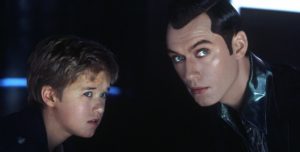
A.I. ARTIFICIAL INTELLIGENCE
Steven Spielberg (U.S. 2001) 146 min. 35MM. With Haley Joel Osment, Jude Law, Frances O’Connor.
Conceived by the late, great Stanley Kubrick but realized by New Hollywood alumnus Steven Spielberg, A.I. is a push-pull showcase for the very distinct sensibilities of the two filmmakers; the result is “a misunderstood classic” (The Telegraph), a fascinating, top-tier work of science-fiction cinema. Based on a short story by Brit author Brian Aldiss, it features Haley Joel Osment as humanoid-child robot David, a prototype “mecha” programmed to love by a grieving population decimated by global warming. Rejected and abandoned by his conflicted mother figure, he embarks on a Pinocchio-referencing adventure in hopes of becoming a real boy. (Adapted from Pacific Cinématheque Program Notes)
TOP OF PAGE
Tuesday, April 4 at 1:15pm
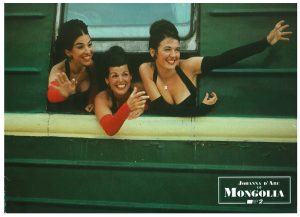
JOHANNA D’ARC OF MONGOLIA
Ulrike Ottinger (West Germany 1989) 165 min. 35MM. With Delphine Seyrig, Irm Hermann, Peter Kern. German, French and Russian with English subtitles.
Called a female Lawrence of Arabia and just as sweepingly romantic, Ulrike Ottinger’s epic adventure traces a fantastic cross-cultural encounter. Seven western women travelers (among them an elegant ethnographer, a prim tourist, a Broadway chanteuse and an all-girl klezmer trio) meet aboard the sumptuous, meticulously reconstructed Trans-Siberian Express, a rolling museum of European culture. Ambushed by a band of Mongol horsewomen, the company is abducted to the plains of Inner Mongolia and embark on a camel ride across the magnificent countryside. Breathtaking vistas, lavish costumes, and the rituals of Mongol life are rendered by Ottinger’s unusual melding of documentary and theatrical fiction.
TOP OF PAGE
Tuesday, April 11 at 1:15pm
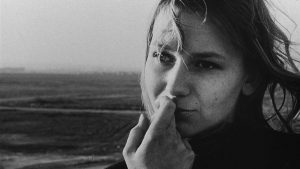
DISTRICT 9
Directed by Niell Blomkamp (U.S. 2009) 112 min. 35MM. With Sharlto Copley, David James, Jason Cope.
Aliens have landed, only to be exiled to a Johannesburg slum in this grittily realistic science fiction thriller implicitly engaged with social issues and histories of bigotry and injustice. Produced by Peter Jackson (The Lord of the Rings Trilogy).
Playing with
LA JETÉE
Chris Marker (France 1962) 28 min. 35MM. With Hélène Chatelain, Davos Hanich, Jacques Ledoux. In French and German with English subtitles.
Inspiration for Terry Gilliam’s Twelve Monkeys, La Jetée is French auteur Chris Marker’s most famous film and his only work of pure fiction, the story of a man drawn through time by the image of a woman standing on the jetty at Orly Airport. An agonizing cry of love to a world gone by, it has been called one of the most influential, radical science-fiction films ever made, a romantic tale of time travel told in still images.
TOP OF PAGE
Tuesday, April 18 at 1:15pm
THE THIN BLUE LINE
Errol Morris (U.S. 1988) 103 min.
Billed as “the first movie mystery to actually solve a murder,” The Thin Blue Line tells the controversial true story of the arrest of Randall Dale Adams for the murder of a Dallas policeman in 1976, and is credited with overturning Adams’ conviction, for which he was sentenced to death. Morris’ treatment of interview material, his use of expressionistic reenactments and the movie’s music by Philip Glass proposed a new style of nonfiction filmmaking, a style that has since become de rigeur in reality-based television programs and feature films.
TOP OF PAGE
Tuesday, April 25 at 1:15pm
![]()
AVATAR
James Cameron (U.S. 2009) 171 min. DCP.
Cameron’s reboot of 3-D, science fiction and the Hollywood epic quickly became the most successful movie of all time upon its release in 2009. “Yes, on one level it’s a crock: predictable, sentimental, and tin-eared. It’s an attempt to rewrite (and reanimate) American history in the form of a barely disguised parable of Native Americans triumphing against white imperialists who would drive them from their ancestral lands… But what spectacle! Avatar is dizzying, enveloping, vertiginous … I ran out of adjectives an hour in” (David Edelstein, New York Magazine).
